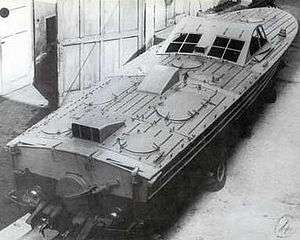MTSM motor torpedo boat
The MTSM motor torpedo boat ( Motoscafo da Turismo Silurante Modificato) was a series of small motor torpedo boats developed by the Italian Royal Navy during World War II. The vessel was an improved version of its predecessor, the motor torpedo boat MTS. This was achieved through a larger sea-going hull with reinforced keel and a sharper stem. The MTSM were designed to be towed by larger motorboats into the target area. Once there, the MTSM could carry out a torpedo attack on moored or stationary ships. The boat could also been transported by land on trailers.
 MTSM on a trailer | |
| Class overview | |
|---|---|
| Name: | MTSM |
| Operators: | |
| Preceded by: | MTS |
| Completed: | 100 |
| General characteristics | |
| Displacement: | 3 tons |
| Length: | 28 ft (8.5 m) |
| Beam: | 7.3 ft 10 in (2.48 m) |
| Draught: | 2 ft (0.61 m) |
| Propulsion: | 2 x Alfa Romeo outboard motors for a total of 190 hp |
| Speed: | 34 knots at full load |
| Complement: | 2 |
| Armament: |
|
Early development
The Italian plans for an assault motor torpedo boat, the MTS model, began in December 1939. The Italian Naval Command goal was a small, high speed two-seat motor torpedo boat based on the MTM. In addition to speed, seaworthiness and range should have made the motorboat capable of carrying out operations against anchored targets successfully. The MTS was armed with two 450mm torpedoes.[1][2]
In the summer of 1940 Baglietto shipyards released the first four prototypes, MTS 1, MTS 2, MTS 3 and MTS 4. The motorboats were tested in an unsuccessful attack on Greek naval forces at Porto Edda, Albania, on 5 April 1941. After that it was clear that the MTS had indeed met the criteria, but due to its small wooden hull it was only partially seaworthy. The demand for a better and larger successor led to the development of the MTSM.[1][2][3]
Specifications and deployment
With a displacement of three tons, the MTSM had a length of 8.4 m, a beam of 2.2 m and a draft of 0.6 m. They were propelled by two 95 Hp Alfa Romeo AR 6c outboard motors and developed a maximum speed of 34 knots at full load.[2] The boats were fitted with radio equipment. Each MTSM was armed with a single 450mm torpedo amidships, behind the crew cockpit, and carried two 50 kg depth charges. The boat undergone its first test trials in the fall of 1941, and surpassed the expectations in terms of speed, maneuverability and steadiness.[4] More than 100 units were delivered by Baglietto between 1941 and 1943.[2]
Operational history
.jpg)
The main combat operational use of the MTSM was against the Allied supply line between El Alamein and Alexandria. These boats belonged to a sub-unit of the Decima MAS, the motorized column "Giobbe", which moved the boats along the coast by trailers. Little was achieved due to Allied air superiority, but the nighttime shelling by British destroyers gave an opportunity to the MTSMs. On 29 August 1942, while a flotilla of destroyers was bombarding Axis positions at El Daba, Egypt, MTSM-228, manned by Sub-Lieutenant Pietro Carminatti,[5] and crewman Cesare Sani[6] torpedoed and disabled HMS Eridge. The crippled destroyer was towed to Alexandria by HMS Aldenham, where she was declared a constructive total loss and was used as a base ship for the rest of the war. Eridge was scrapped in 1946.[7] MTSM-228, which fired her single torpedo from a range of 150 meters, was bombed by a British aircraft and had to be abandoned by her crew. The next morning, the small craft was still adrift and the Italians attempted to take her to the coast, but a German Stuka strafed the boat by mistake and blew her to pieces.[5]
At German request, another motorized column, the "Moccagatta", was deployed to the Crimea in support of Operation Barbarossa from May 1942 to March 1943. The unit comprised five MTMs and five MTSMs. Italian reports claim that in the night of 6 June 1942 a 4,000 ton Soviet freighter was torpedoed and crippled by an MTSM and later destroyed by German aircraft. On 6 July a small craft carrying 13 Soviet servicemen was captured by another MTSM off Foros.[8][9]
The MTSMs were widely used in the Mediterranean theatre by September 1943, when Italy signed an armistice with the Allies. Ten units joined the Italian Co-Belligerent Navy, while an unknown number was active with the navy of the Italian Social Republic, a fascist statelet in northern Italy which remained part of the Axis. Most operations of the latter units took place in the Adriatic sea, sometimes with mixed Italian and German crews.[2]
See also
- MAS motor torpedo boat
- MT explosive motorboat
References
- Greene and Massignani, pp. 40-41
- Fock, Harald (1996). Marine-Kleinkampfmittel. Bemannte Torpedoes, Klein-U-Boote, Kleine Schnellboote, Sprengboote gestern – heute – morgen. Nikol, pp. 115. ISBN 3-930656-34-5 (in German)
- Greene and Massignani, p. 72
- Greene, Jack and Massignani, Alessandro (2004). The Black Prince And The Sea Devils: The Story Of Valerio Borghese And The Elite Units Of The Decima Mas. Da Capo Press, p. 40. ISBN 0306813114
- Borghese, Valerio (1952). Sea Devils: Italian Navy Commandos in World War II. Naval Institute Press, p. 189. ISBN 1-55750-072-X
- HMS Eridge (L 68)
- Greene and Massignani, p. 122
- Italeri 1/35 MTM Barchino by Ray Mehlberger Archived 2012-10-19 at the Wayback Machine
- Borghese, pp. 178-179